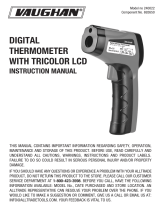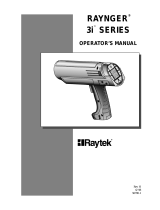Page is loading ...

NOTE: This manual is for three models, which
are distinguished by model A, B and C
hereinafter.
A B C
Emissivity
adjustable
Temperature
Alarming
CONTENTS
1. Safety Information………….………….
2. Precautions……………………….……
3. Feature Locations……………………..
4. LCD Illustration………….……..………
5. Measurement Principle….……………
6. Measurement Method…………………
7. Distance to Spot Ratio……..…………
8. Emissivity………………………………
9. Temperature alarming function………
10. Specifications………………...………
11. Changing the Battery……….……….
12. Accessories…………………………..
1
1
2
4
7
7
9
9
13
13
14
15

1. Safety Information
● Please read the following information carefully
before using the meter.
● Safety symbols:-
Danger/Important Information prompt.
Comply with CE safety standards.
This instrument is compatible with the following
standards:
EN61326-1
EN61010-1
EN60825-1
Warning!
Do not point laser directly at eye or
indirectly off reflective surfaces.
2. Precautions
● After abrupt ambient temperature changes,
allow instrument temperature to stabilize for 30
minutes before using for measurement.
1
● Avoid operating near strong electromagnetic
fields such as arc welders, induction furnaces,
etc.
● Do not expose thermometer to excessive
ambient temperatures.
● Keep the thermometer clean and avoid getting
dust into the detector’s optics.
● Do not use solvents to clean the meter.
3. Feature Locations
2

1. Sighting Groove
2. Laser orifice
3. Detector orifice
4. Tripod nut
5. Trigger
6. Battery cover
7. LCD
8. Laser button
9. Emissivity reduction button (Model B)
Temperature reduction button (Model C)
10. Mode button
11. Emissivity addition button (Model B)
Temperature addition button (Model C)
12. Backlight button
13. °C/°F button
3
4. LCD illustration
Model A:
1. Laser-On Indicator
2. Holding indicator
3. The first temperature display
4. Low power indicator
5. Average value indicator
6. MAX/MIN indicator
7. The second temperature display
8. °F temperature unit
9. °C temperature unit
10. Emissivity display
11. Measurement indicator
4

Model B: (Emissivity adjustable)
1. Laser-On Indicator
2. The first temperature display
3. Average value indicator
4. MAX/MIN indicator
5. Emissivity display
6. The second temperature display
7. °F temperature unit
8. °C temperature unit
9. Low power indicator
10. Holding indicator
11. Measurement indicator
5
Model C: (Temperature alarm)
1. Laser-On Indicator
2. Holding indicator
3. The first temperature display
4. Average value indicator
5. MAX/MIN indicator
6. Temperature alarming indicator
7. The second temperature display
8. °F temperature unit
9. °C temperature unit
10. Low power indicator
11. Emissivity display
12. Measurement indicator
6

5. Measurement Principle
Infrared thermometers detect infrared energy
emitted by objects. The instrument focuses
energy through its lens, changing the
temperature of a special material that creates an
electrical signal. A microcomputer processes this
signal and displays the output on the panel of the
thermometer. The laser is used only for sighting
the instrument and has no other effect on
temperature measurement.
6. Measurement Method
1. To measure the temperature of an object, aim
the unit at the object and press the trigger. As
long as you hold the trigger, you can measure
temperature continuously. After releasing the
trigger, the LCD will hold the temperature values.
The first display indicates the current value.
The second display indicates the calculated (Avg.,
MAX, MIN or MAX-MIN).
7
2. Use the laser button to activate the laser for
aiming at distant objects.
3. Use the backlight button to illuminate the
display in low-light conditions.
4. Press the “MODE” button to change the
second temperature display. This display can
show AVG (average), MAX (maximum), MIN
(minimum), MAX-MIN (span) or Alarm (Only
model B).
5. Press the °C/°F button to change the unit of
measure.
6. (Only model B) Press “+” button to add the
emissivity, and press “-” to reduce the emissivity.
(Please refer to the chapter 8 “Emissivity”.)
7. (Only model C) Press “MODE” button, when
“ALARM” symbol appears, you can set the
alarming temperature value. Press “+” to add the
alarming temperature value, and press “-” to
reduce it. (Please refer to the chapter 9
“Temperature alarming function”.)
8

7. Distance to Spot Ratio
The thermometer has an optical angle and spot
size as shown below.
Object Focus tube Sensor
The target should be larger than the unit’s optical
spot size. The distance to spot ratio for this
thermometer is 12:1 (12mm spot at 1meter) as
shown below.
8. Emissivity
Emissivity is a term used to describe the energy
emitting characteristics of a material. The higher
the emissivity value a material has, the more
9
infrared energy it will emit at a particular
temperature. And the meter’s emissivity is more
close to the material’s emissivity, the more
particular measurement result you can get. So, it
is important to set a just emissivity according to
the material.
1. Model A and model C have a fixed
(non-adjustable) emissivity of 0.95. Most organic
materials and oxidized metal range in emissivity
between 0.85 and 0.98.
2. Model B has an adjustable emissivity from
0.10 to 1.00. For different materials, you can set
a different emissivity. An object’s emissivity is
relative to its material, finish, color and
temperature etc. The attached sheet is the
emissivity of different substances in the normal
temperature.
10

Substance Emissivity Substance Emissivity
Asphaltum 0.90 - 0.98 Plastic 0.8 – 0.95
Concrete 0.70 – 0.75 Plastic film 0.5 – 0.95
Sand 0.8 – 0.9 Ceramic glaze 0.85 – 0.95
Soil 0.85 – 0.96 Marble 0.90 – 0.94
Water 0.92 – 0.98 Quartz 0.90
Ice 0.96 – 0.98 Aluminium
(oxidized)
0.7 – 0.8
Snow 0.83 Copper(oxidized) 0.7 – 0.8
Glass 0.9 – 0.95 Iron (oxidized) 0.78 – 0.82
Keramics 0.9 – 0.94 Lead (oxidized) 0.3
Gypsum 0.89 – 0.91 Zinc (oxidized) 0.1
Red brick 0.75 – 0.90 Zincified iron 0.3
Drygoods 0.93 – 0.98 Cast iron
(polished)
0.2
Charcoal 0.96 Iron plate
(oxidized)
0.75 – 0.82
Hominine skin 0.98 Steel plate
(oxidized)
0.8 – 0.9
Leather 0.75 – 0.80 Stainless steel
(Polished)
0.1
Paper 0.8 – 0.94 Gold (polished) 0.1
Lignum 0.8 – 0.9 Silver (polished) 0.1
Asbestus 0.95 Copper(polished) 0.1
Paint 0.9 – 0.98 Aluminium
(polished)
0.1
Rubber 0.90 – 0.98 Chromium
(polished)
0.1
You also can get an object’s emissivity by the
following method.
(1) Attach a black adhesive tape or spread some
black paint on to the surface.
(2) Set the thermometer’s emissivity at 0.95, and
then point the meter to the surface of the black
adhesive tape (/black paint), and make the
measurement. Then you can get a measurement
value (say for T1).
(3) Clear the black adhesive tape (/black paint),
and point the meter to the same place. Adjust
emissivity during measuring; when the
measurement value is T1, the emissivity value on
LCD is about the object’s emissivity.
(4) For some object (e.g. water or with high
temperature) that can’t be attached a black
adhesive tape or spread the black paint, you can
use a contact thermometer make measurement
first, and then use the same method as the above
to get the emissivity.
12

9. Temperature alarming function
(Only model C)
Press “MODE” button, and when the “ALARM”
symbol appears on LCD, you can set the
alarming temperature value. Press “+” to add the
value, and press “-” to reduce the value. When
the measurement temperature is more than the
setting value, the inside buzzer will sound.
This function can help operator find the high
temperature points by “scan” an object.
10. Specifications
LCD Display: 2-temperature, 4 digits
Distance to Spot Ratio: 12:1
Emissivity:
Fixed at 0.95 (Model A and C)
Adjusted from 0.10 to 1.00/step: 0.01 (Model B)
Spectral Response: 8-14μm
Measurement Range:
-20°C ~ 537°C / -4°F ~ 999°F
Alarming temperature range (Model C):
13
30°C ~ 535 °C / 86°F ~ 995°F
Accuracy: -20°C ~ 50°C: ±2.5°C
50°C ~ 537°C ± (reading×1%+1°C)
Response Time: 1.5 seconds
Laser Power: Less than 1 mW
Auto-off: After 10 seconds
Backlight: White
Operating Environment: 0~ 40°C, 10~90%RH
Storage Environment: -10°C ~ 60°C, <75%RH
Battery: 9Volt, 6F22
Size: 162mm (L) × 56mm (W) ×190mm (H)
11. Changing the Battery
When the battery is nearly
exhausted, the low battery
symbol will appear on the
display. The battery should
be replaced soon after this
occurs. Pinch the “OPEN”
characters to swing the
battery cover open.
14

12. Accessories
9V battery………………………….1 pcs
Operating manual………………...1 pcs
Carrying bag………………………1 pcs
15
/

